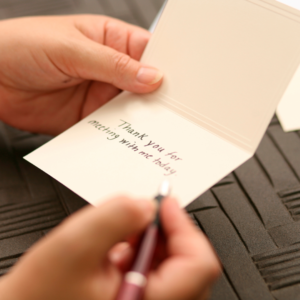
Earlier in the summer there was a post on LinkedIn that posed an important question. – Is it important to write a thank you note after an interview? Now this wasn’t something I found to be controversial, but those who commented were certainly fired up.
The question posed by the LinkedIn author asked if it was an outdated concept to expect a thank you note after interviewing a candidate. The thank you note would recognize the interviewer’s time and reiterate interest in the role. This post opened the door to a number of questions. Was writing a thank you note a best practice and simply good manners or a means of cultural bias? Writing a thank you note is often a personal decision and isn’t something that’s discussed in school, making it potentially unfamiliar to younger generations.
The Pros and Cons
Naysayers of the practice said job seekers may not even receive a rejection letter after applying to a job, so it’s unrealistic to think an interviewer should receive a thank you note. This comment was countered by saying a thank you note could be an effective way for a job candidate to stand out from the crowd.
Some likened a thank you note to a “follow-up” email that expressed interest in the role and highlighted things discussed during the interview. This is a technique often successfully used by salespeople to land a sale. The conversation also brought to light that thank you notes and their importance, or lack thereof, may be unique to the United States. Depending on the environment, some saw it to be polite, while others saw the expectation of writing thank you notes as elitist.
Defining Expectations
Other commenters looked at it to show personal values. The decision to write a thank you note or not could be viewed to show alignment between the values of a candidate and that of an organization. For example, within an environment focused on appreciating individual talents, a thank you note could align with a similar company value.
In short, this is a topic that will likely continue to generate a number of different perspectives, neither right nor wrong. Perhaps instead we can simply acknowledge that some things will always be more important to some people than to others.
When in doubt, we recommend erroring on the side of kindness. It only takes a moment to say thank you and courtesy in any form will always be appreciated. Plus, many recruiters and hiring professionals still see a thank you note as a plus when hiring applicants.

